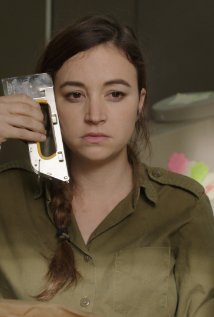
Much More Than An Israeli “Private Benjamin”
Film

Zero Motivation film
“Zero Motivation” is a new and delightfully poignant Israeli film that zings myths of women’s equal participation in the Israeli army, with frank humor and staple guns to battle the military’s bureaucracy and sexism.
Inspired by her own experiences with other women relegated to boring assignments in administrative offices for their mandatory two-year army service, writer/director Talya Lavie’s debut premiered at the 2014 Tribeca Film Festival in New York City, where it garnered two awards. “We believe a new, powerful, voice has emerged,” crowed the jury for the competitive Best Narrative Feature award. The jury for the second annual Nora Ephron Prize for a female director or screenwriter, which included Delia Ephron, offered similar acclaim, stating that “Zero Motivation” was “definitely the most hilarious film we saw at the festival…the winning film is a fresh, original, and heartfelt comedy.” But this isn’t just an Israeli version of “Private Benjamin”; this film is far more darkly pointed and complex.
The film follows one year in the life of soldier-secretaries in the human resources office at a desert base in the south of Israel in 2004, a year marked by rapid changes in technology and gender relations. The narrative unfolds in three chapters. The first expands on Lavie’s 2005 20-minute film-school thesis, “The Substitute” (available online with an English transcript), focusing on the naïve schemes of Daffi (Nelly Tagar), who hails from a northern town, to find a replacement so she can transfer to Tel Aviv. Part 2, “The Virgin,” focuses on Daffi’s best friend, Zohar (Dana Ivgy, a renowned young film star), for whom “anything is better than the kibbutz”—even a forlorn desert outpost. As the titular virgin, Zohar is enticed by the unfamiliar presence of men she wasn’t raised with, and begins to take sexual risks. When she is briefly liberated from paperwork, her first assignment on guard duty becomes a vengefully comedic moment that involves humiliating male nudity at the point of a gun. By Part 3 Daffi has become “The Officer,” to the frustration of their ambitious, perpetually thwarted supervisor Rama (Shani Klein), who wants to make her pioneer soldier mother proud, despite the rebellious women serving under her and the condescending men over her.
Lavie deftly balances comedy with deadly serious issues. She sensitively portrays an array of women from diverse social strata, including an immigrant from Russia and one from Ethiopia. Focusing the lens tightly on young female soldiers, she reveals the ways in which these women are at once fully developed adults and game-playing teenagers. Mean girl cliques, eating disorders, text-messaging miscommunications, boyfriend troubles and suicide loom larger than any external enemy. Opening first in Israel, Canada, and Australia, Zeitgeist Films will put this must-see for Jewish feminists in theaters across the U.S. later this year. Don’t miss it.


